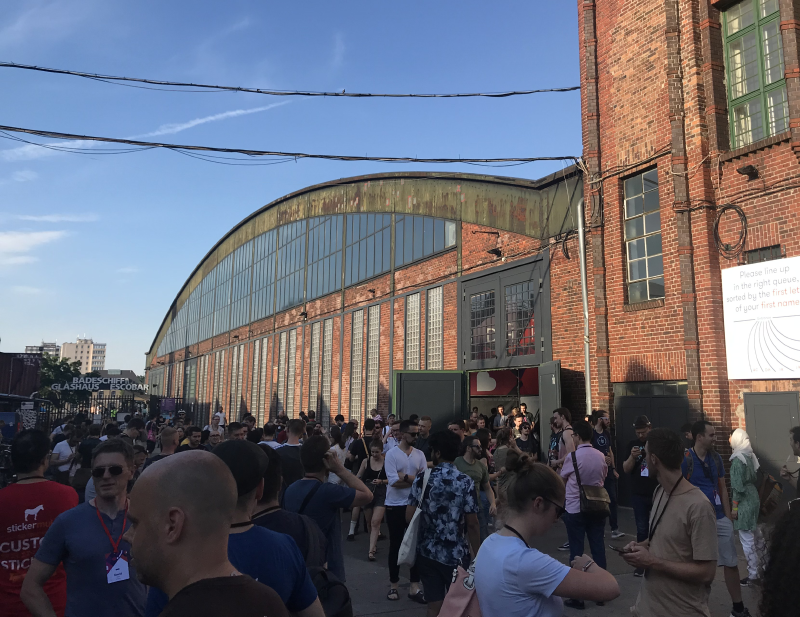Let us make 2020 a year of empowerment and decentralization
The nice thing about undertaking a distributed dismantling of the corporate web is that each and everyone of us can contribute in our own little ways.

I snapped this photo right after JSConfEU 2019 had finished. People were emerging from the depths of this industrial building, to be greeted by the hot Berlin weather.
This year I attended JSConfEU 2019 for the first time. It made quite the impression on me, and even more so when I realized that it was the last one (for now?). I got to talk to a lot of industry professionals, many whom I look up to. And I was quite moved by C J Silverio’s talk on the economics of open source.
“This last decade has been about consolidation into a monolithic service. But I think the coming decade is going to be federated (C J Silverio).”
The pendulum of tech is swinging towards decentralization, but it won’t happen by itself, we need to work for it. For me that means thinking two or three times about what technologies and web sites I choose to invest my time and money into.
Recently, I tried running Gitlab on my Raspberry Pi 4. It was easy to get started and it worked very well. But I then learned that Gitlab were willing to prioritise business over ethics, which caused a big community uproar, one that was further fueled when Gitlab later announced that it wanted to ship third-party tracking by default. It’s important to note that Gitlab has since responded to the community by updating their policy on customer acceptance. Furthermore, Gitlab also cancelled their immediate plans to add tracking, for the time being they’re seeking feedback on how to best implement product usage tracking on their issue tracker.
Gitlab isn’t the main issue here but I want to argue that it exemplifies a problem in the tech world. The problem revolves around how we have a lot of open source code at our disposal which is not democratically governed. In itself it’s not that bad, but it becomes a problem when you throw venture capitalists into the mix. VCs work hard at making a 10x profit from any open source projects that they fund.
One could argue that VC funded open source leads to better services for end-users. But to that I’d argue that it can’t empower developers because that would make no sense in a VC world. As a VC you want to assert control over a technological asset that developers depend upon. And to achieve this dependency you want to achieve some level of disempowerment or in other words what we call vendor lock-in. An asset with locked-in users can then be traded as a commodity. This isn’t compatible with the idea of having empowered developers who could prioritize ethics over business.
The call for citizen tech #
After recounting this tale of JSConfEU 2019, Gitlab and open source at large I guess it doesn’t come as a surprise that I now have git.nilsnh.no running Gitea instead of Gitlab. It wasn’t that easy to setup Gitea but I learned some very useful things about reverse proxies and how to securely run services under GNU/Linux.
This Christmas I also put some time into working on my blog. It’s still built with Hugo because I like how responsibly it’s developed by its community. I built a new theme from scratch which prioritizes readability and adds IndieWeb support.
The IndieWeb community to me is a global movement that concerns itself with empowering citizens through technology. It’s not about developers building stuff for users, instead it’s about citizens who employ technology for the betterment of their lives. IndieWeb represents an antidote to the technologically deterministic veil of the corporate web. To learn more I recommend this talk I gave on the IndieWeb.
I’m impatient for a better web that’s led by citizens and not soulless union-busting corporations. Last year I deleted Facebook and convinced friends and family to come join me on Signal. I even submitted a opinion piece to one of the larger Norwegian newspapers.
It’s not enough to quietly leave problematic services like Facebook. We need to actively encourage others to do the same. We need to lead by example. For now I understand that people have good reasons to remain on problematic platforms like Facebook, but their needs can surely be fulfilled elsewhere if we find good digital alternatives.
I’m looking forward to 2020. Inch by inch, codeline by codeline, ally by ally I hope to help turn the corporate tide of the web and make it a much more empowering place to surf. It starts by spending some time on my tech and helping others with theirs.
 Nils Norman Haukås
Nils Norman Haukås